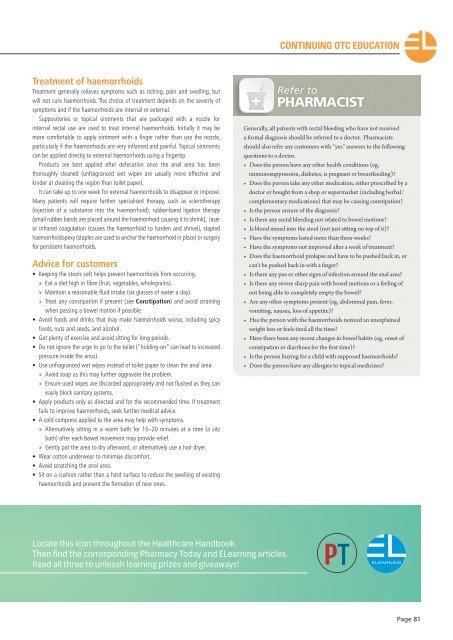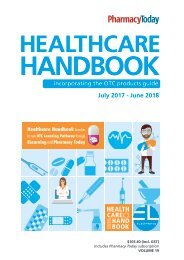2017 HCHB_digital
Create successful ePaper yourself
Turn your PDF publications into a flip-book with our unique Google optimized e-Paper software.
CONTINUING OTC EDUCATION<br />
Treatment of haemorrhoids<br />
Treatment generally relieves symptoms such as itching, pain and swelling, but<br />
will not cure haemorrhoids. The choice of treatment depends on the severity of<br />
symptoms and if the haemorrhoids are internal or external.<br />
Suppositories or topical ointments that are packaged with a nozzle for<br />
internal rectal use are used to treat internal haemorrhoids. Initially it may be<br />
more comfortable to apply ointment with a finger rather than use the nozzle,<br />
particularly if the haemorrhoids are very inflamed and painful. Topical ointments<br />
can be applied directly to external haemorrhoids using a fingertip.<br />
Products are best applied after defecation once the anal area has been<br />
thoroughly cleaned (unfragranced wet wipes are usually more effective and<br />
kinder at cleaning the region than toilet paper).<br />
It can take up to one week for external haemorrhoids to disappear or improve.<br />
Many patients will require further specialised therapy, such as sclerotherapy<br />
(injection of a substance into the haemorrhoid), rubber-band ligation therapy<br />
(small rubber bands are placed around the haemorrhoid causing it to shrink), laser<br />
or infrared coagulation (causes the haemorrhoid to harden and shrivel), stapled<br />
haemorrhoidopexy (staples are used to anchor the haemorrhoid in place) or surgery<br />
for persistent haemorrhoids.<br />
Advice for customers<br />
• Keeping the stools soft helps prevent haemorrhoids from occurring.<br />
»»<br />
Eat a diet high in fibre (fruit, vegetables, wholegrains).<br />
»»<br />
Maintain a reasonable fluid intake (six glasses of water a day).<br />
»»<br />
Treat any constipation if present (see Constipation) and avoid straining<br />
when passing a bowel motion if possible.<br />
• Avoid foods and drinks that may make haemorrhoids worse, including spicy<br />
foods, nuts and seeds, and alcohol.<br />
• Get plenty of exercise and avoid sitting for long periods.<br />
• Do not ignore the urge to go to the toilet (“holding-on” can lead to increased<br />
pressure inside the anus).<br />
• Use unfragranced wet wipes instead of toilet paper to clean the anal area.<br />
»»<br />
Avoid soap as this may further aggravate the problem.<br />
»»<br />
Ensure used wipes are discarded appropriately and not flushed as they can<br />
easily block sanitary systems.<br />
• Apply products only as directed and for the recommended time. If treatment<br />
fails to improve haemorrhoids, seek further medical advice.<br />
• A cold compress applied to the area may help with symptoms.<br />
»»<br />
Alternatively sitting in a warm bath for 15–20 minutes at a time (a sitz<br />
bath) after each bowel movement may provide relief.<br />
»»<br />
Gently pat the area to dry afterward, or alternatively use a hair dryer.<br />
• Wear cotton underwear to minimise discomfort.<br />
• Avoid scratching the anal area.<br />
• Sit on a cushion rather than a hard surface to reduce the swelling of existing<br />
haemorrhoids and prevent the formation of new ones.<br />
Refer to<br />
PHARMACIST<br />
Generally, all patients with rectal bleeding who have not received<br />
a formal diagnosis should be referred to a doctor. Pharmacists<br />
should also refer any customers with “yes” answers to the following<br />
questions to a doctor.<br />
• Does the person have any other health conditions (eg,<br />
immunosuppression, diabetes, is pregnant or breastfeeding)?<br />
• Does the person take any other medication, either prescribed by a<br />
doctor or bought from a shop or supermarket (including herbal/<br />
complementary medications) that may be causing constipation?<br />
• Is the person unsure of the diagnosis?<br />
• Is there any rectal bleeding not related to bowel motions?<br />
• Is blood mixed into the stool (not just sitting on top of it)?<br />
• Have the symptoms lasted more than three weeks?<br />
• Have the symptoms not improved after a week of treatment?<br />
• Does the haemorrhoid prolapse and have to be pushed back in, or<br />
can’t be pushed back in with a finger?<br />
• Is there any pus or other signs of infection around the anal area?<br />
• Is there any severe sharp pain with bowel motions or a feeling of<br />
not being able to completely empty the bowel?<br />
• Are any other symptoms present (eg, abdominal pain, fever,<br />
vomiting, nausea, loss of appetite)?<br />
• Has the person with the haemorrhoids noticed an unexplained<br />
weight loss or feels tired all the time?<br />
• Have there been any recent changes in bowel habits (eg, onset of<br />
constipation or diarrhoea for the first time)?<br />
• Is the person buying for a child with supposed haemorrhoids?<br />
• Does the person have any allergies to topical medicines?<br />
Locate this icon throughout the Healthcare Handbook.<br />
Then find the corresponding Pharmacy Today and ELearning articles.<br />
Read all three to unleash learning prizes and giveaways!<br />
Page 81



